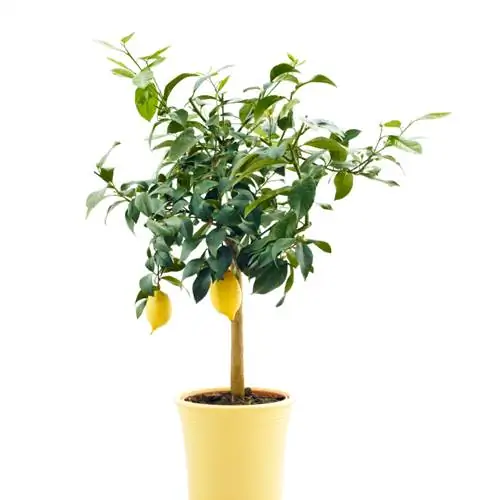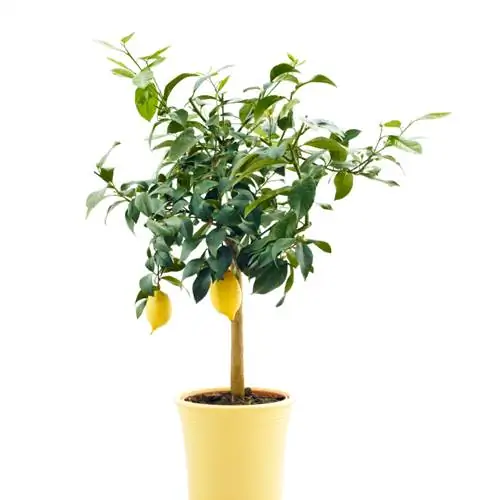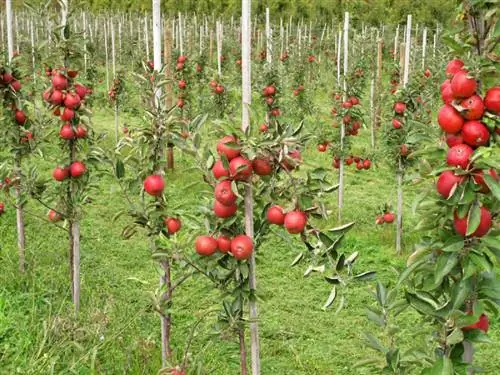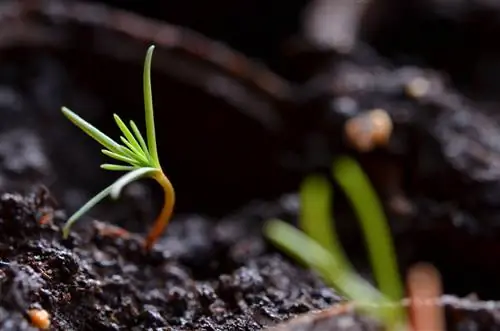- Author admin leonars@hobbygardeners.com.
- Public 2023-12-16 16:46.
- Last modified 2025-01-23 11:20.
Nobody knows exactly where the lemon tree originally comes from. An origin from Central Asia, primarily India and southwest China, is suspected. However, lemons have been cultivated in the Mediterranean region for many centuries; there is also evidence of cultivation during the heyday of the Roman Empire. Since around the 16th and 17th centuries, the subtropical tree has also been cultivated in Central and Northern Europe, although not in the open field. Many nobles have created orangeries with these fascinating plants.

Can you cultivate a lemon tree in Germany?
In Germany, a lemon tree can be cultivated in a pot because the climate is unsuitable for outdoor cultivation. The plant needs a lot of light and warmth, protection from moisture as well as cool overwintering and regular care in order to grow he althily and bear fruit.
Lemon tree needs warmth and lots of light
Unfortunately, despite global warming, it is currently not possible to plant lemons and other citrus fruits in Germany. The continental European climate, with its relatively short and mostly humid summers and comparatively long and cold winters, is not suitable for lemons. An exception to this rule is the so-called bitter lemon, also known as the three-leaf orange. The ornamental shrub is frost hardy down to around minus 25 °C and is the only deciduous citrus species.
Lemon tree ideal for keeping in containers on the terrace or winter garden
Lemons are not only quite sensitive in winter, but also need appropriate protection in summer. The sensitive plants cannot tolerate too much moisture, which is why they have to be put outside in the warm months, but in a protected place at night. A nighttime summer parking space is ideal
- near a heat-emitting house wall
- covered
- and sheltered from the wind.
Even during a period of wet weather or heavy rain, you should not leave your lemon outdoors. Nevertheless, the lushly growing plants love lots of light and air and should be kept outside to thrive better. Keeping them indoors is only recommended if cool winter storage can be guaranteed. To ensure that the lemon tree remains transportable, it should be planted in a sufficiently large container.
If well cared for, the tree will produce lemons
In contrast to other subtropical or tropical plants, a lemon tree in Germany also develops many fragrant, white to pink flowers and often fruits - provided the care is correct. Lemons are relatively maintenance-intensive and need regular water and fertilizer. The lemons ripen within six to nine months after flowering begins, but even when fully ripe they can remain on the tree for a long time without being damaged. To feel good, lemons need
- a sufficiently large pot
- with a water drain at the bottom
- a drainage layer
- Citrus Soil
- a sunny, sheltered and warm pitch
- regular fertilizer applications
- not too much water
- do not use hard water!
- a cool winter
Lemons are quite susceptible to infestation with sucking insect pests, especially after improper overwintering.
Tips & Tricks
Don't underestimate the space required by a lemon: the tree reaches a height of two to three meters after just a few years if it is not regularly and vigorously pruned.






